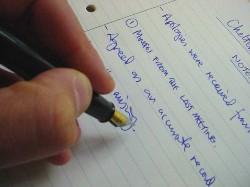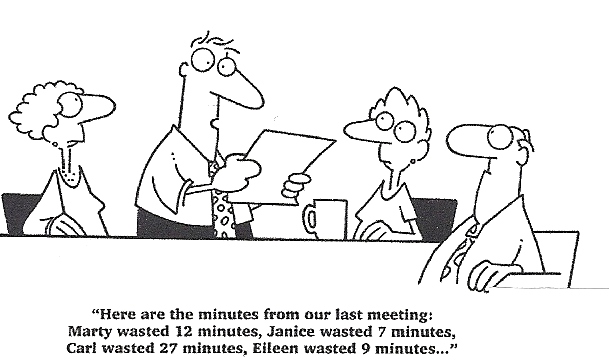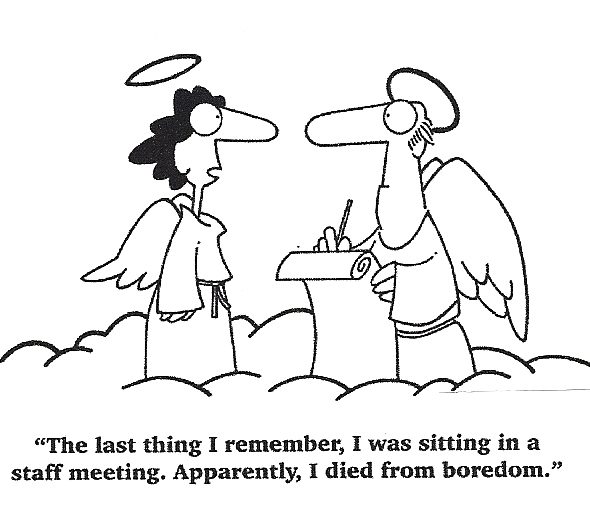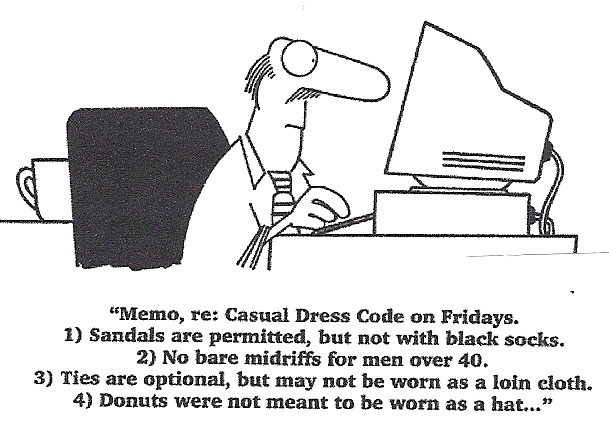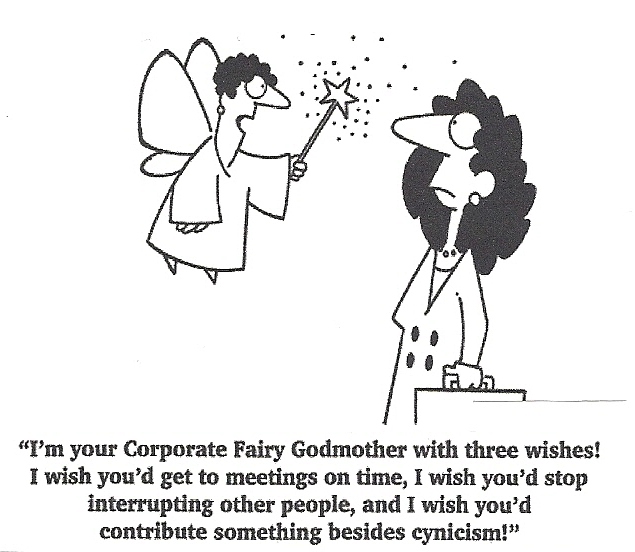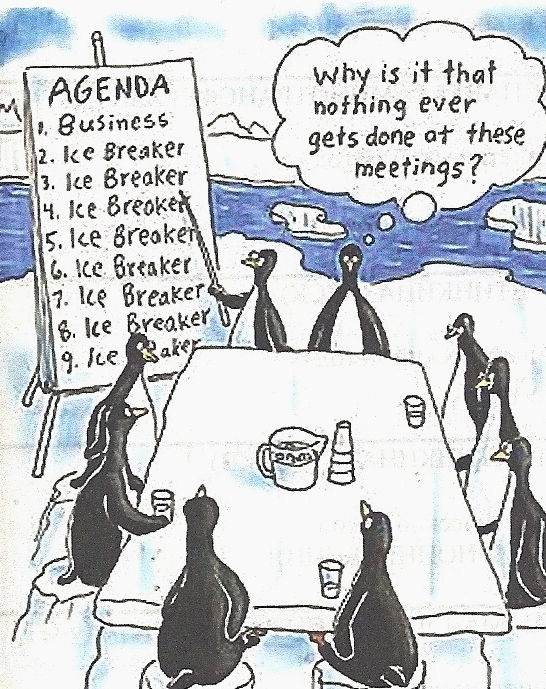
- •Improving Communications
- •Oral communications
- •Written communications
- •7 Tips to become a Good Conversationalist
- •Six Common Mistakes That Spoil Conversations
- •1. Blabbermouthing
- •2. The "take-away" and "me-too" syndrome
- •3. Unsolicited advice
- •4. Interrupting
- •5. Contradicting
- •6. Stingy contributors
- •8 Правил знайомства з діловими партнерами
- •18 Ways to improve your body language
- •6 Чарівних букв
- •Voice and Language
- •Visual aids
- •Fail to prepare
- •No weak opening
- •When I know I have to make a presentation, even a small one before a very limited number of people, I start feeling nervous…
- •When a big meeting is coming up, one that will involve a number of presentations from a range of people…
- •I would say my ability as a presenter is…
- •While I am up on stage, I…
- •Comments about my presentations are generally…
- •If I have to go “off the cuff”…
- •If I could describe public speaking as a food, it would be…
- •Visual aids versus handouts
- •Я к вдало провести ділову зустріч.
- •Introducing the Agenda
- •Introducing the First Item on the Agenda
- •1. What is the desired outcome of the meeting? (How will you know the meeting was successful?)
- •2. Who needs to be there? (And who doesn’t?)
- •3. Is the agenda prepared? (If not now, when?)
- •4. What can I do to prepare? (How can I help others prepare?)
- •5. What can I do to make this meeting succeed? (What is my responsibility?)
- •Discuss the following questions:
- •Exercise 6
- •Negotiating
- •Well, we could make it 7,5 % .
- •The trouble is, the general manager isn't very interested in marketing. He's only concerned about …..5…... If you make it 10%, I might be able to persuade him.
- •But you said…
- •6 Найпоширеніших помилок при проведенні переговорів
- •Communicating with someone in writing
- •The salutation
- •The subject title
- •The body of the letter
- •The parting
- •The signature
- •Inquiries (Enquiries)
- •Поради при написанні ділових листів
- •……………: Always proofread and edit your letters.
- •Avoid the use of …..1….. Words
- •Informal Style Formal Style
- •Identify yourself, if necessary
- •Include necessary information
- •Ten keys to writing an essay
- •Budget your time carefully
- •Read the topic carefully
- •Plan your essay before you write
- •Be sure your handwriting is as clear and legible as possible
- •Follow a clear, logical organization
- •Topic Type a: Contrast/Opinion
- •Use concrete examples and specific reasons
- •Use signal words to indicate transitions
- •Use a variety of sentence types.
- •Check your essay for errors.
- •Електронна пошта
- •Chief, Guy, Sport
- •My Buddy
- •Assumption Junction
- •Peak-a-Boo
- •2 (Suggested answer)
- •Listening 4
- •Contents
- •References
Introducing the Agenda
Have you all received a copy of the agenda? There are three items on the agenda. First … Shall we take the points in this order? If you don't mind, I'd like to ... go in order (OR) skip item 1 and move on to item 3 I suggest we take item 2 last.
Allocating Roles (secretary, participants)
(name of participant) has agreed to take the minutes. (name of participant) has kindly agreed to give us a report on this matter. (name of participant) will lead point 1, (name of participant) point 2, and (name of participant) point 3. (name of participant), would you mind taking notes today?
Agreeing on the Ground Rules for the Meeting (contributions, timing, decision-making, etc.)
We will hear a short report on each point first, followed by a discussion round the table. I suggest we go round the table first. The meeting is due to finish at... We'll have to keep each item to ten minutes. Otherwise we'll never get through. We may need to vote on item 5, if we can't get a unanimous decision.
Introducing the First Item on the Agenda
So, let's start with… Shall we start with… So, the first item on the agenda is… Pete, would you like to kick off? Martin, would you like to introduce this item?
Closing an Item
I think that covers the first item. Shall we leave that item? If nobody has anything else to add,
Next Item
Let's move onto the next item The next item on the agenda is … Now we come to the question of…
Giving Control to the Next Participant
I'd like to hand over to Mark, who is going to lead the next point. Right, Dorothy, over to you.
Summarizing
Before we close, let me just summarize the main points. To sum up, ... In brief, Shall I go over the main points?
Finishing Up
Right, it looks as though we've covered the main items. Is there any Other Business?
Suggesting and Agreeing on Time, Date and Place for the Next Meeting
Can we fix the next meeting, please? So, the next meeting will be on... (day), the . . . (date) of.. . (month) at... What about the following Wednesday? How is that? So, see you all then.
Thanking Participants for Attending
I'd like to thank Marianne and Jeremy for coming over from London. Thank you all for attending. Thanks for your participation.
Closing the Meeting
The meeting is closed. I declare the meeting closed.
B
Participating in a Meeting
The following phrases are used to participate in a meeting. These phrases are useful for expressing your ideas and giving input to a meeting.
Getting the Chairperson's Attention
(Mister/Madam) chairman. May I have a word?
If I may, I think...
Excuse me for interrupting. May I come in here?
Giving Opinions
I'm positive that... I (really) feel that...
In my opinion...
The way I see things...
If you ask me,...
I tend to think that...
Asking for Opinions
Are you positive that...
Do you (really) think that... (name of participant) can we get your input?
How do you feel about...?
Commenting
That's interesting.
I never thought about it that way before.
Good point!
I get your point. I see what you mean.
Agreeing
I totally agree with you.
Exactly!
That's (exactly) the way I feel.
I have to agree with (name of participant).
Disagreeing
Unfortunately, I see it differently.
Up to a point I agree with you, but..
(I'm afraid) I can't agree
Advising and Suggesting
Let's... We should...
Why don't you....
How/What about..
I suggest/recommend that...
Clarifying
Let me spell out...
Have I made that clear?
Do you see what I'm getting at?
Let me put this another way...
I'd just like to repeat that...
Requesting Information
Please, could you...
I'd like you to...
Would you mind...
I wonder if you could...
Asking for Repetition
I'm afraid I didn't understand that.
Could you repeat what you just said?
I didn't catch that. Could you repeat that, please?
I missed that. Could you say it again, please? Could you run that by me one more time?
Asking for Clarification
I don't quite follow you. What exactly do you mean?
I'm afraid I don't quite understand what you are getting at.
Could you explain to me how that is going to work?
I don't see what you mean. Could we have some more details, please?
Asking for Verification
You did say next week, didn't you?
Do you mean that...?
Is it true that...?
Correcting Information
Sorry, I think you misunderstood what I said.
Sorry, that's not quite right.
I'm afraid you don't understand what I'm saying.
That's not quite what I had in mind.
That's not what I meant.
Exercise 3
Suggest phrases which could be used by a chairperson in the following situations in a meeting.
To welcome the participants to a meeting.
To state the objectives of the meeting.
To introduce the agenda.
To introduce the first speaker.
To prevent an interruption.
To thank a speaker for his/her contribution.
To introduce another speaker.
To keep discussion to the relevant issues.
To summarize discussion.
To ask if anyone has anything to add.
To suggest moving to the next topic on the agenda.
To summarize certain actions that must be done following the meeting ( for example, do research, write a report, meet again, write a letter, etc.).
To close the meeting.
Exercise 4
1. Match each item on the left with the correct description on the right.
|
|
2. Use phrase in exercise 1to complete the excerpts.
Frank:
Jennifer:
Frank: Jennifer:
Frank:
Derek
Jennifer:
Frank: Derek:
Jennifer:
Frank:
Jennifer:
Derek:
Frank: Derek:
Frank:
Derek: Frank: |
Let’s get started then. 1_____________________is, discuss how Derek’s interview with Charlie should go… Well, I think it’s usually useful to break this kind of news midweek, rather than doing it on Friday afternoon. Certainly. 2____________________... …There should be a package we offer him, and quite a few details to sort out. Yes certainly. I think 3___________________now, so the next question is, you know, how we are going to do it, and where. 4_________________, Jennifer? …I haven’t really thought this through , but I mean, 5 ________________ it might be better to do it outside the office in a sense. 6___________________ . It needs to be in your managerial role, not you in your role as a personal friend… I certainly think it should be done somewhere in the office, and preferably in his office rather than in ours… Well, 7__________________a lunch, Derek, in a quiet pub or restaurant? So, the in-between thing, it’s a working lunch. It’s work, but it’s not in the office. It could be a compromise, yes. Well, 8 __________________please? I tend to think it might be better if you did do it in the office… I mean, Jennifer, you’ve had a lot of experience of this. How do people react when they… People tend to be rather shocked, they tend to be angry, but rather briefly, and they do tend to… 9_________________, they are not able to formulate an immediate and rational response… Give him the background. Yes, I mean but briefly, you’re saying that I should get to the point and say ‘you know, Charlie, it has been decided that, basically, you are being made redundant, and the normal terms and conditions of our contract will apply… Ok, so 10___________________I think we’ve agreed, Derek, that you will actually be telling Charles… Yes. And that you’ll do it inside the company, and you’ll do it probably in your office. Right?
|
![]()
When you have finished task 2, listen and check your answers.
![]()
Translate into English.
Англійський дослідник наради Елан Баркер справедливо думає, що постійний
аналіз проведених колективних обговорень веде до одержання прибутку. Оцінка повинна бути об'єктивною, формулюватися всією групою на окремій зустрічі, поза рамками зборів. Можна запропонувати учасникам заповнити анкету:
- чи була необхідна нарада?
- чи ясна її мета?
- чи відповідала вона меті?
- чи згодні ви, що тривалість і час проведення були зручні?
- чи задовольнило вас приміщення?
- чи вчасно ви одержали порядок денний, документи?
- чи всі пункти порядку денного були викладені?
- чи володіли присутні відповідною компетенцією?
- чи здійснював голова належний контроль?
- чи задоволені ви процедурою прийняття рішень?
Аналіз зборів можна провести більш ефективно, якщо залучити незалежного
експерта. У нього буде можливість сторонньої оцінки того, що йде добре, а що необхідно змінити.
Work in groups of four. Decide on a chair and have a brief meeting using the situation below.
After a few minutes’ preparation, the chair starts the meeting, introduces the agenda, invites the first speaker to make his/her proposal, prevents interruptions, brings in other speakers, summarizes, etc.
Meeting To identify ways to reduce company costs Time: Finish: Place: Participants: AGENDA
|
![]()
Taking meeting minutes guide
|
|
Read the text and do the exercises.
Minutes of meetings form a historical record of a group's work. They serve as a record of decisions and details when people's memories fail or when they disagree. They remind people of assignments they've taken on and deadlines they need to meet. They inform those not present of what happened at the meeting. They give future members of the organization a way to build on past successes and avoid reinventing the wheel.
Some groups designate one person to take the minutes at every meeting; others rotate the job. Do what works best for your group, as long as the information gets recorded and preserved somewhere.
The minutes of a meeting should include the following (if they apply to your particular group and your meetings):
Date, time and place of meeting.
List of people attending, and any members who were absent.
Time the meeting was called to order.
Approval of the previous meeting's minutes, and any amendments.
Summary of reports, announcements, and other information shared.
Proposals, resolutions, motions, amendments, a summary of the discussion, and final disposition (if you are using formal parliamentary procedure, record who made the motion and who seconded it).
Time of adjournment.
Next meeting date, time and location.
Name of person taking the minutes.
Motions and resolutions should be recorded verbatim and should be read back during the meeting to make sure they have been accurately transcribed.
Summarize the discussion, capturing key points and decisions reached. When someone takes on an assignment, a deadline is set, or other important agreements are reached, make sure to record them. This will serve as a reminder when the minutes are read later on.
Separate fact from opinion. Facts are objective and indisputable; opinions are personal views. Take this sentence: "The low turnout for the event could be due to poor advertising." Whose idea is this? Attribute opinions to their source (e.g. "Jane suggested that..." or "The group concluded that...")
Sometimes, it can be helpful to distribute the minutes before the next meeting. This gives people a reminder of assignments and deadlines, as well as when and where the next meeting is.
Distribute copies and read the minutes near the beginning of the next meeting. Any corrections or additions should be recorded in the minutes of that meeting. The group should then approve the minutes, meaning that they agree that they are accurate and complete, either as read or as amended.
Tips
It is a good idea to sit as close as possible to the chair of the meeting as this will allow you to hear everything and to ask for clarification without having to raise your voice.
Make note not only of the concerns, but also of any accomplishments discussed in the meeting.
Write things as they happen. For example, if someone said something about one subject, then you moved on to another issue, but something else happened about the first subject, don't group them together.
Make sure you have the correct name spellings, contact email addresses and telephone numbers.
Remember, minutes are very important. They are saved and might be referred to for years and years to come. If it is a legal matter, someone's reputation may depend on it.
Remember, even though you are taking notes, you may still participate in the debates.
Have people write down their motions. This will save you the trouble of having to phrase things so as to meet other's ideas.
Keep these minutes filed in a safe place.
Consider learning shorthand or using a laptop for the taking minutes.
Type up your minutes as soon as possible after the meeting. It’s best to do this while the events are still fresh in your mind. It’s also important that meeting participants get a copy of their action items as soon as possible after the meeting.
Reading comprehension
Discuss the following questions with your partner.
Exercise 1
What are the reasons for writing minutes?
What information is included?
Exercise 2
Imagine that you were appointed a secretary to take minutes at the meeting. Explain why…
you should sit as close to the chair as possible.
you should write things as they happen.
people should write down their motions.
minutes should be kept in a safe place.
You should type up the minutes as soon as possible after the meeting.
Minutes should be circulated to the meeting participants.
![]()
Exercise 1
Look at the minutes below and get ready to answer all your partner’s questions about it.
Minutes of the Group Leaders Start-up Meeting
Date: 26 March 2010
Time: 2.00 pm
Venue: Conference Room
In attendance: Ahmin Charge (Chair), Teem Player, Lee Derr, Sue Pervisor
Action:
Apologies: Apologies were received from Noel T’Day.
Minutes of Last Meeting: The minutes of the last meeting were distributed, and signed as a true record of it.
Matters arising: There were no matters arising.
Planning: AC explained the importance of planning ahead and requested questions in this area. A discussion ensued, but there were no problems or concerns voiced in relation to planning.
Research and Testing: TP reported that initial research was going well, and shared the early findings. AC suggested this would be of benefit to other team members, and LD and SP both agreed this should be passed on.
Any Other Business: There was no other business
Exercise 2
One of the four words in each group has no connection with the others. Which one?
1 2 3 4 5 6 7 8 9 |
a) as regard a) for example a) in addition a) whereas a) since a) yet a) also a) owing to a) in summary |
b) in relation to b) e.g. b) moreover b) thus b) although b) but b) as well b) as a result of b) finally |
c) in connection with c) in fact c) furthermore c) therefore c) as c) however c) conversely c) apart from c) lastly |
d) in addition to d) such as d) despite d) consequently d) seeing as d) likewise d) too d) due to d) in conclusion |
Exercise 3
Choose the best word to fill in the gap.
Can we (arrange/set/agree) up a meeting for early next week?
I’m afraid I’ve got to bring (up/along/forward) this morning’s meeting to ten o’clock.
Something came up so they (postponed/cancelled/fixed) Monday’s meeting till Friday.
Robert is off sick so Michael will have to (charge/chief/chair) the staff meeting.
We have got to (go/attend/visit) the meeting in London because our boss will be in Spain.
It’s a very important meeting so make sure you don’t (miss/lose/avoid) it.
On Friday we have a meeting (of/with/to) our most important client.
It wasn’t really a meeting – just an informal (speech/report/chat) over coffee.
![]()
Translate into English.
Протокол наради
це первинний офіційний документ, на підставі якого карівник має право вимагати від працівників виконання доручених ним завдань. Секретар фіксує в протоколі найбільш важливі моменти: основні положення висловлені ораторами, досягнення мети наради, прийняті рішення, їхніх виконавців і терміни виконання.
Виділяють наступні частини цього документа:
1.Найменування.
2.Дата.
3.Перелік присутніх.
4.Порядок денний.
5.Слухали.
6.Ухвалили.
7.Підпис (голови, секретаря).
![]()
You are going to hear the endings to three different meetings. First listen, and say what each meeting was about. Do they end on a positive note?
Now answer these questions about the same three meetings:
Write down two phrases that can be used to conclude a meeting. Which phrase is formal and which is informal?
Write down two questions used to find out if everyone agrees to end the meeting.
Which meeting is likely to be followed by some informal socializing?
Which meeting was probably between people of different nationalities?
Why does the first speaker summarize what has been said/decided?
You have arranged with two or three other students to have a ten-minute meeting in order to discuss how your English course is progressing. Follow the flow-chart, taking it in turns to express your opinion.
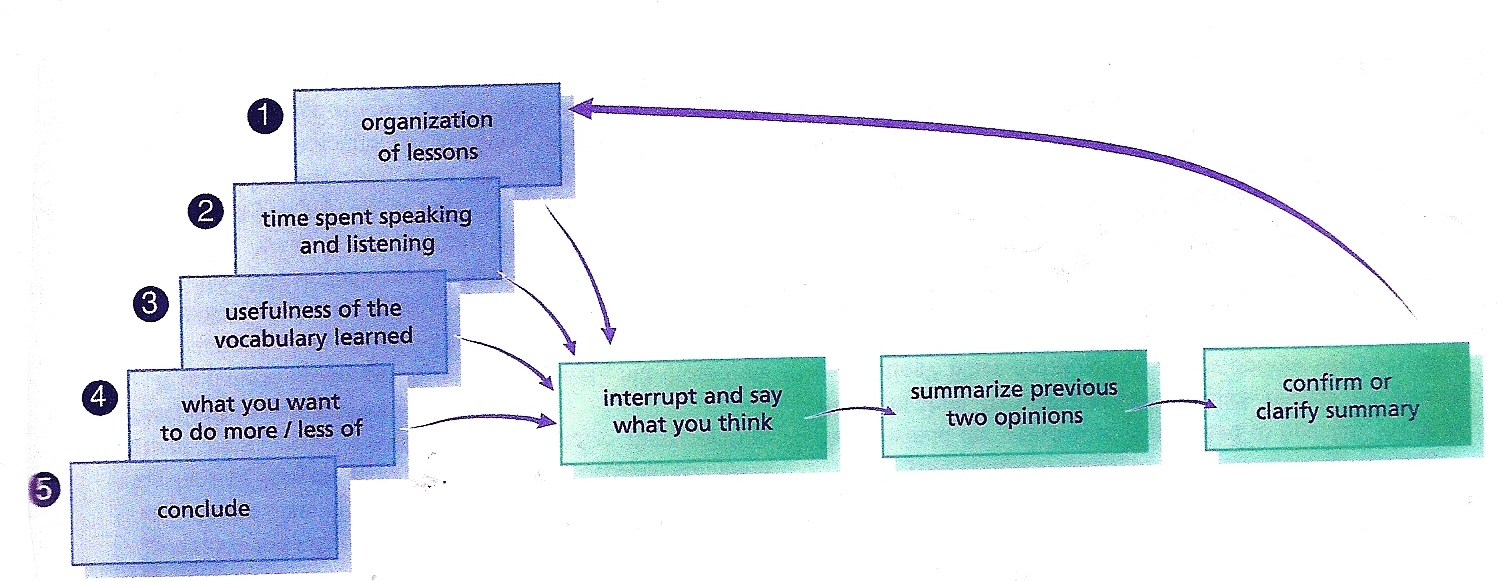
|
|
|
|
|
Task 1
Choose one of the articles and take the following steps:
read the article.
identify the main points.
write down 10 questions.
make the vocabulary card (new words, expressions, idioms, etc).
prepare and make one-minute presentation on the issue discussed in the article.
1
Seven Difficult Personality Types and How to Deal with Them
Have you ever felt the pulse pounding, word-sputtering frustration of having your meeting disrupted by:
a hardcore bully
an ego-centered princess
a passive-aggressive
a baby
negative Ned or Nancy
a people pleaser, or
a non-player.
No matter how challenging, belligerent, or negative the difficult person’s behavior, don’t take it personally. By identifying the seven difficult personalities and responding to each with openness and sound techniques, you can improve their dynamics and therefore run better meetings.
Meetings are great opportunities to share information with your team, to build skills, to motivate, and to give your team a chance to sound off. But even the best planned meetings can be a total loss if difficult people are not handled in effective ways.
Try these techniques the next time you encounter one of these difficult people.
Hardcore
Hardcore personalities are hostile, abusive and intimidating. They always have to be right and will charge like angry bulls if you challenge or cross them.
Take a deep breath. Let them blow off steam and express their anger and frustration. But, draw the line. Do not let them get abusive.
Address them by name to maintain control. Then state your position clearly and avoid the temptation to argue. You won’t win a battle with them, especially in a public forum. Learn to set your boundary early on.
Princesses
Princesses are experts and appear to know more than others should about a particular subject. Facts are power to them and since they know the facts, they feel superior. They want to be special and center stage.
Because you cannot “fake it” with them, make sure you know the facts and information. You can also capitalize on what they know by asking questions. They love to show off and have others appreciate their knowledge.
Use their knowledge strategically. Give them praise and maybe they’ll come out of their towers.
Passive aggressive
Passive aggressive personality types take potshots. They undercut your authority in devious ways by using sarcasm, which they often disguise as a joke. They will not be direct with their criticism.
Try to turn their attention and comments to the issues not the personalities involved. Once they realize that you won’t put up with their sniping, they usually stop. They do not want to be center stage, so tend to avoid open confrontation.
The baby
Babies see everything negatively. They complain, whine, and act defeated. Since they often believe no one thinks they are important, start your interactions by listening to what they say. Steer them toward the facts, which are usually much less negative than what they believe.
Maintain control by bringing up the negatives yourself. Then dismiss the negatives logically. Direct the baby’s attention to the more positive aspects of the situation. When baby asks a negative question, turn to the rest of the group to answer. Don’t give them much eye contact.
Negative Ned or Nancy
Babies seem pale compared to the “negators”. Negative Ned isn’t just negative, he distrusts anyone in power. He believes that his way is the only right way and his motto is “I told you so.” He sees the down side of every issue.
Stay positive, but realistic. Delay discussing solutions since Ned or Nancy will dismiss every solution as you bring it up. Refuse to argue with them and stick with the facts.
People pleaser
While these people are easy to like, they can be difficult personalities to deal with. They over commit themselves and their staffs because they can’t say “NO.”
Carefully limit how much you ask of them to eliminate the disappointments caused by missed deadlines. In meetings, they may tend to volunteer for way too much. Try: “You’re working on so many worthy projects….who else would like to sign up for this one?” Affirm their contributions and help them say “no.”
Non-player
These people are the most difficult personalities to deal with. They don’t reveal their true motives, and you end up in a guessing game trying to find out what makes them tick. It is vital to get them to participate in meetings, so they don’t leave with their hidden agendas and work counter to the team.
The most effective strategy is to draw them out with open-ended questions. Even if the silence between you and this unresponsive person grows chasm-like, wait it out.
Encourage people to change
When you ignore difficult people, they don’t change. But when your support positive change and refuse to indulge their behaviors; you encourage them to learn new coping skills -at least in your presence.
2
Five Questions to Ask Before Any Meeting
|
Perhaps I’m being too generous here – I’ve heard some meetings described as awful, terrible, painful, a waste of time, and other things I wouldn’t choose to put in print.
This article is written to help remove the curse from meetings. These five questions can make any meeting more effective – if you both ask and answer them before your meeting. These questions will help you as the meeting leader, facilitator or planner and also will help you as a meeting participant.
Each question has a companion question to further help you improve the results your meeting produces.
The five questions

